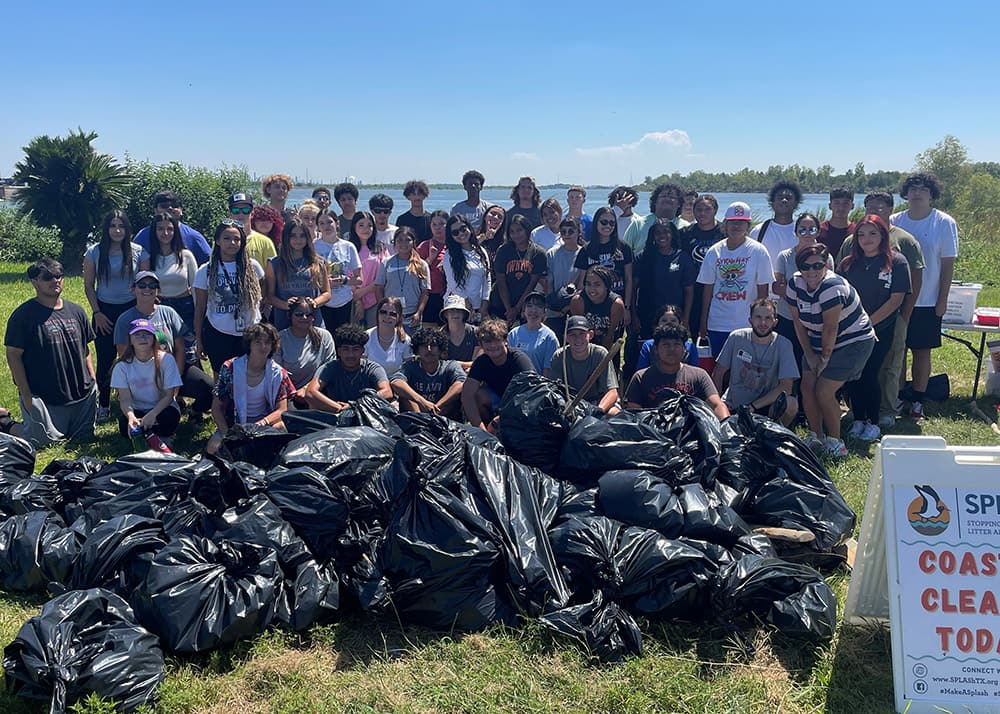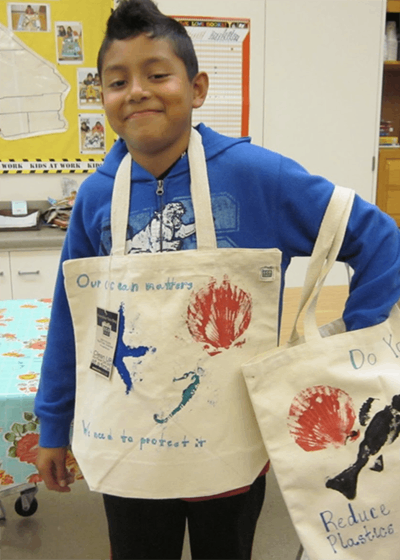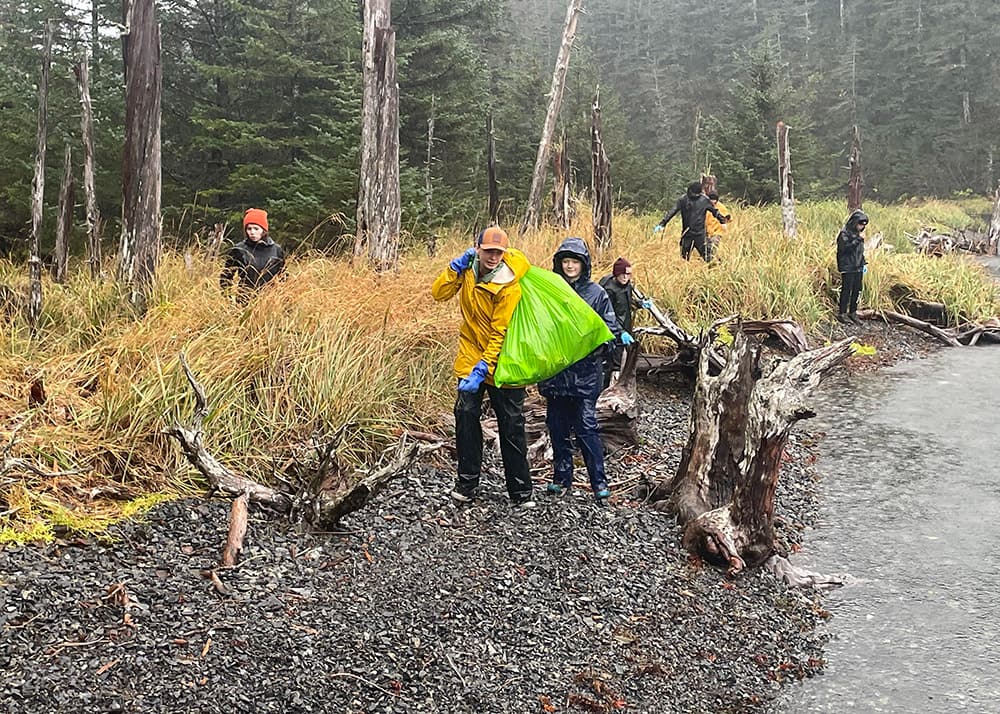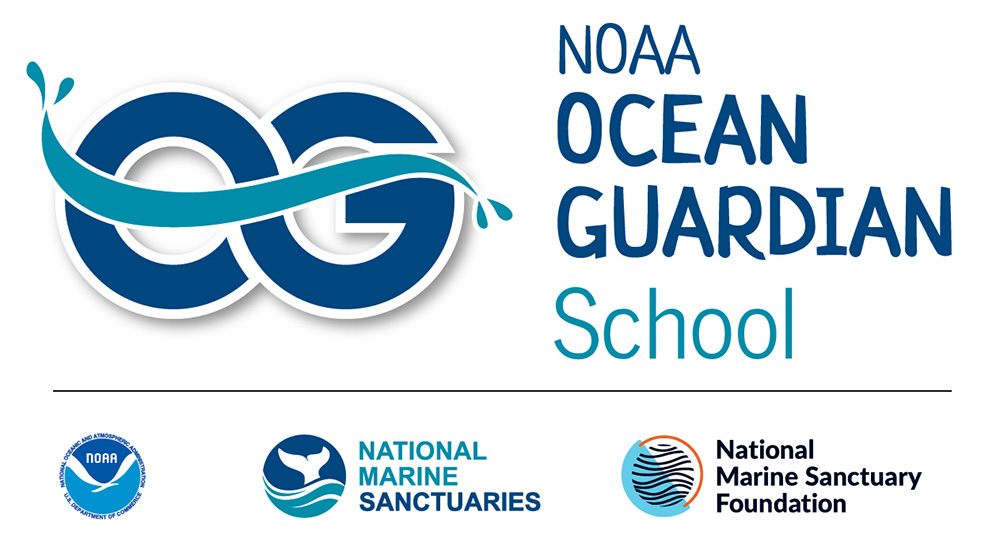NOAA Ocean Guardian Schools: The Next Generation for Our Blue Planet
By Chloe McKenna
November 2022
NOAA’s Office of National Marine Sanctuaries established the NOAA Ocean Guardian School program in 2009. Across the United States and its territories, K-12 schools submit project proposals every year to acquire funding and participation in the multi-year program. Selected schools carry out hands-on school or community-based stewardship projects that fit under one of the program pathways: marine debris, 6Rs (rethink/reduce/refuse/reuse/rot/recycle), watershed restoration, school garden/habitat, and energy and ocean health.

Throughout the 2021–2022 school year, several schools across the country were successful in their Ocean Guardian School projects.
In the Pacific, Simon A. Sanchez High School (Yigo, Guam) involved over 50 students through online educational materials, as well as school-wide recycling and composting programs. The students were able to create a website with virtual escape rooms, scavenger hunts, and karaoke to educate students and staff about the 6Rs. They are excited to continue building this digital resource in the coming years! On campus, recycling was expanded to aluminum cans, plastic bottles, cardboard, newspaper, and shredded paper. The cardboard and paper waste was used by biology and permaculture students as mulch and compost.
University Elementary at La Fiesta (Rohnert Park, California) took on a school-wide project involving nine classes of students from transitional kindergarten to fifth grade. The core of the project revolved around the school garden/habitat pathway where students attended garden classes weekly and Ocean Guardian principles were incorporated into both the garden and primary classroom curricula. This resulted in an increase of students’ climate literacy and understanding of human impacts on their local watershed.
Varying grade levels participated in different ways, from designing and installing signs to educate communities about native wildlife and advocate for their protection, to creating murals of the local watershed. Students used art and written communication to inform the local community about these projects and hosted presentations to teachers, families, and students of all levels at their annual open house. Having hands-on experiences with planting native shrubs, annuals, and perennials in the school’s habitat garden reinforced the importance of providing a healthy habitat using native plants for the native wildlife.

Yorkshire Academy (Houston, Texas), a K-5 private school, focused on energy and ocean health and the 6 Rs through a variety of activities and levels of engagement. Third grade students illustrated Flower Garden Banks National Marine Sanctuary calendars and wrote and illustrated poems about each sanctuary in the National Marine Sanctuary System. These books were distributed internationally to schools in the UK, Australia, and Asia and the students sold their calendars to raise money for the Flower Garden Banks National Marine Sanctuary Foundation. Fourth and fifth grade students worked collaboratively to collect data of carbon dioxide levels weekly in the carpool lanes, and presented prototypes for measuring carbon dioxide levels to a school “Shark Tank” program.
Students were particularly interested in conducting research on biofuels, fossil fuels, and algae farms. Fourth graders created labs to inform fifth graders on the best ways to promote algae growth. The most productive designs were taken on by fifth grade engineers to grow algae farms using carbon dioxide. A visit to the Ocean Star oil rig allowed students to learn more about oil production. Lastly, students wrote letters to the editor at the Houston Chronicle and wrote to a fast food restaurant chain about reducing their styrofoam usage.
Families were involved in the project throughout the year, and these projects connected students and the school community to their local watershed and increased their knowledge of protecting the ocean. “My favorite moments are seeing my young students speak to families in person and on zoom so knowledgeable about our project with great confidence. They will carry this knowledge into middle school and the years ahead. Their parents can't believe what these students know about our planet and the marine sanctuary system.” said Ocean Guardian lead teacher Jacqui Stanley. Overall, students were heavily involved and invested in the program and wanted to take on more projects.
On the east coast, Wiley Magnet Middle School (Winston-Salem, North Carolina) engaged a large majority of the student body with information about plastic pollution and marine debris and through water quality sampling activities. Students designed and distributed posters about single-use plastic collection bins, collected trash and other debris along the school’s adopted waterway after school, and created public service announcements for students and families to view. These videos were shared in all science classes and were posted to the school website. The school is located downstream from several industrial sites, so water testing was a great hands-on learning opportunity in their project. Both sixth and eighth grade students were involved in water quality testing.
Sixth grade students were visited by a water scientist who discussed the importance of keeping waterways safe and were able to participate in a water ecology class off campus at Camp Hanes. Ocean Guardian lead teacher Elisabeth A. Moore said, “Many of our students do not get out of the city. When we traveled out of the city for a field trip to take a water ecology class, they were fascinated by how this waterway was clean of debris and had lots of organisms they could see.” These watershed experiences brought the land-ocean connection to life for the students at Wiley Magnet Middle School.
Save Spectacular: The Future of Ocean Conservation
As NOAA’s Office of National Marine Sanctuaries celebrates its 50th anniversary this year, the NOAA Ocean Guardian School program encourages the next generation of ocean stewards to think about the type of ocean they want to see in the future. Schools were encouraged to participate in an optional 50th celebration activity, which could be a “day of action” project, 50th challenge, or outreach activities. These activities could be related to their program pathway and participating schools received additional funding to execute their task.

Nineteen schools in California, New York, Illinois, Alaska, Texas, Florida, Guam, American Samoa, and Hawai’i participated in day of action projects. From community beach cleanups, planting coastal native plants to improve water quality, increasing on-campus composting and recycling programs, and creating art and music about national marine sanctuaries, students were able to celebrate the importance of national marine sanctuaries.
At Dimond High School (Anchorage, Alaska), students conducted a remote beach cleanup in Whittier, Alaska, building on their 6Rs pathway as an Ocean Guardian School. Starlight Elementary School (Watsonville, California) oversaw a waste audit at Pajaro Dunes State Beach where they collected microplastics. Jovita Idár Elementary School (Chicago, Illinois) worked to create 50 art pieces that celebrate the value, health, and importance of Chicago’s watershed. These collective activities act as inspiration for students to be ocean stewards in their own communities, no matter how near or far they live from the ocean, to help create lasting change for our environment.
“Our Ocean Guardian Schools continue to show their passion and commitment to our one, global ocean by making changes in their communities,” says Seaberry Nachbar, director of the Ocean Guardian School program. “Their focus on creating positive stewardship activities that engage the school staff, the parents, and the neighbors while focusing on protection and restoration is inspiring and humbling. These schools are standing up to the challenges that they are and will be facing in the future and saying “We will not conduct business as usual, watch us push against the incoming tide!””

Is your school interested in helping protect the ocean for the future? The 2023–2024 application will be available to download from our website by Spring 2023. Please review Ocean Guardian School Program Guidelines and Requirements for more detailed information before you complete the application.
Chloe McKenna is a student at Eckerd College and a consultant for the National Marine Sanctuary Foundation in support of NOAA's Office of National Marine Sanctuaries.
The Ocean Guardian School Program is managed by NOAA's Office of National Marine Sanctuaries with funding coordinated by the National Marine Sanctuary Foundation.

